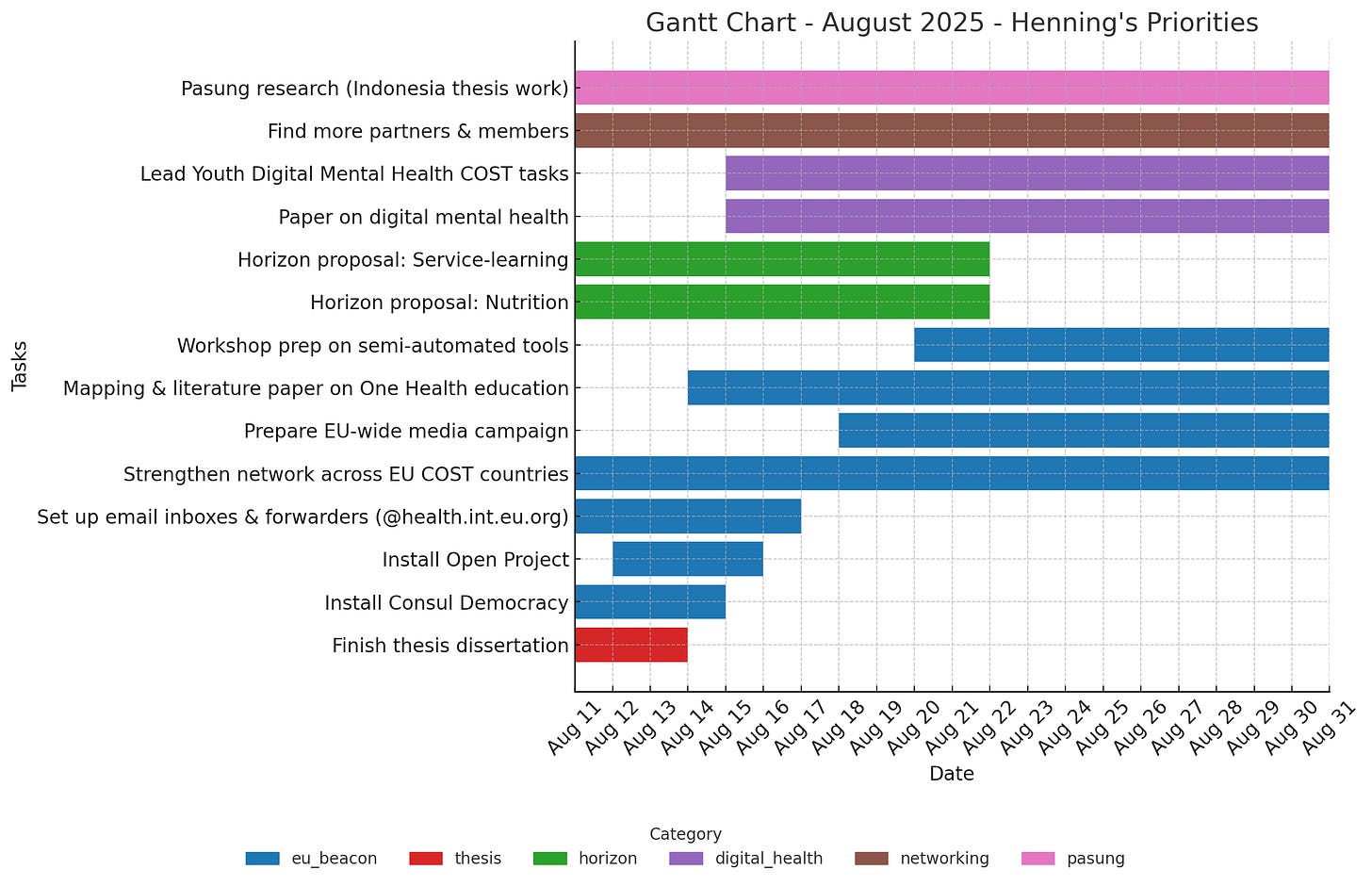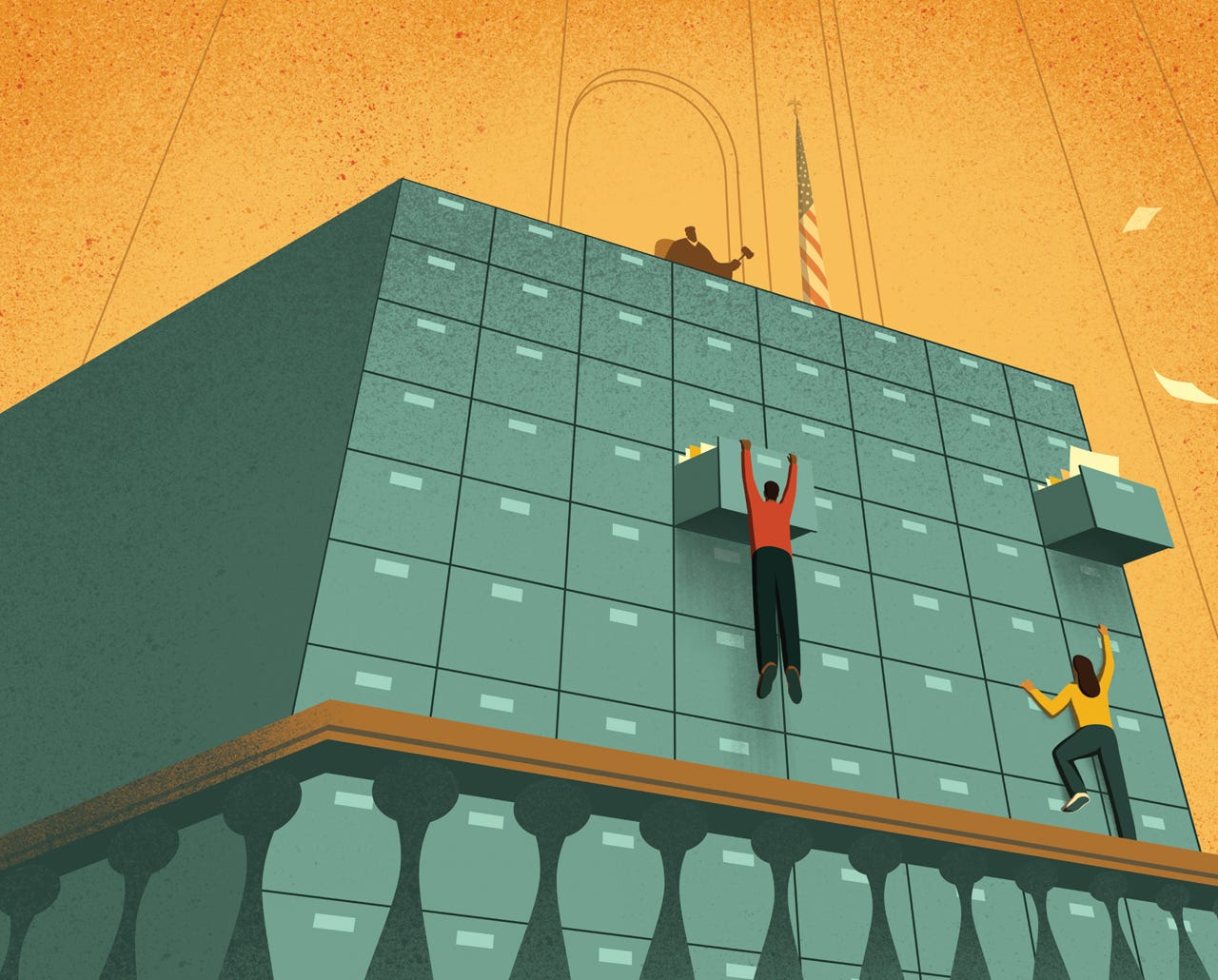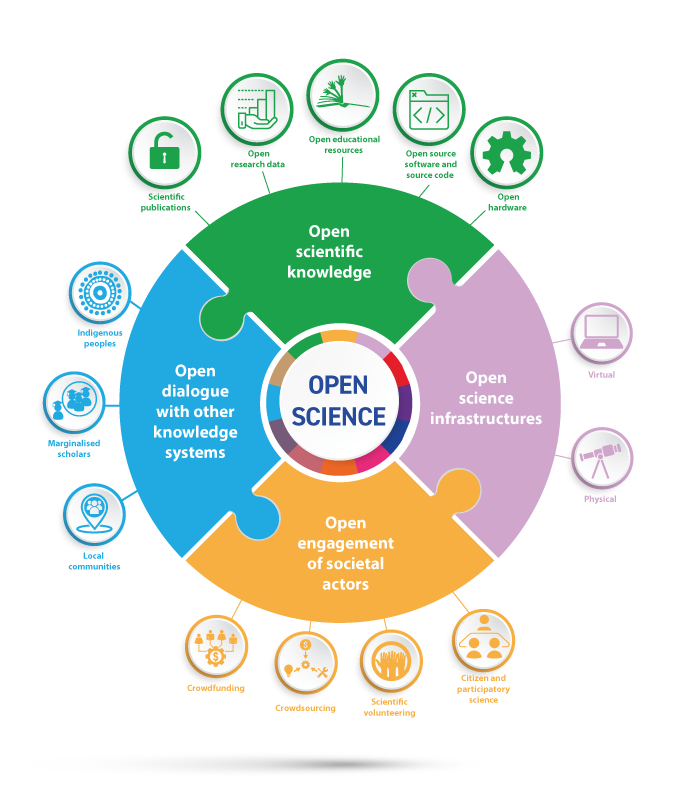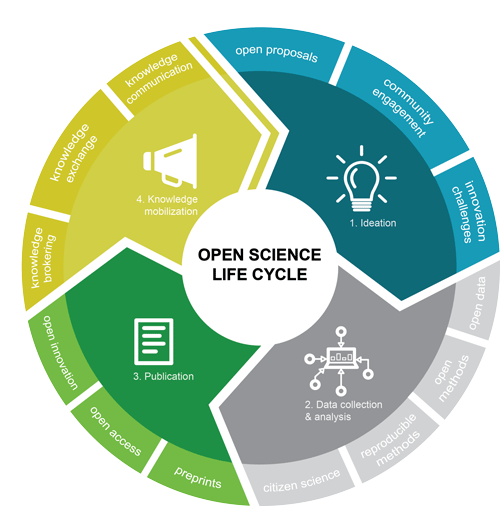Bittersweet news: closing the summer with critical milestones for EU BEACON and my doctoral work, still under threat
Final post before September, as the focus shifts to thesis completion, network infrastructure, and advancing collaborative research proposals
Reading time: approximately 15 minutes.
Brief summary: this final update before September outlines the convergence of two decisive fronts: the urgent submission of the final reviewed doctoral dissertation by 13 August, and the parallel strengthening of EU BEACON’s network, governance, communications, and curriculum development systems. The text situates these priorities within a personal and institutional context shaped by prolonged threats, absence of legal protection, and systemic inaction in the face of violence. I still live and work in fear. The post details the deployment of institutional communications, participatory governance, and integrated project management platforms to support network-wide decision making, operational execution, and educational innovation, embedding open science and open data best practices throughout. The post also highlights forthcoming outputs, including the mapping and literature review paper on One Health education, the September workshop on semi automated analytical tools, and Horizon proposals on brain health through nutritional interventions and service learning. It reaffirms a long-standing commitment to transparency, reproducibility, and collective accountability, while extending gratitude and an open invitation for collaboration, co-authorship, and engagement in future initiatives.
This will be my last post until September, as I focus entirely on these priorities to bring forward more substantial developments, entering into a period of deep focused systematic work to accomplish all urgent objectives. I wish all readers well during this period. For those interested in contributing to the Horizon proposals on brain health through nutritional interventions and on service learning, I encourage direct contact with Dr. Anupoma P. Haque and Professor Janaina Minelli in the action chat groups, as they are the current proposals’ principal investigators. I also extend an open invitation to join the EU BEACON One Health Education communications work group or any of the other task forces within the action, to help shape and deliver our collective objectives.
As the summer reaches its final stretch, I am entering the most critical phase of the work year, thus my need for radio silence on top of my wish to respect your summer time. On my end, the immediate top priority is the urgent submission of the final reviewed and improved version of my doctoral dissertation by mid this week, a non negotiable milestone that underpins the academic and professional foundations for the next phase as doctor and professor. As readers know, the path to this point has been marked by conditions that have been not only academically and professionally challenging, but life threatening. The sustained absence of timely and adequate institutional support to end the violence I have endured has prolonged an environment of harm, coercion, and intimidation that no researcher or educator should face. It remains incredibly painful to live under daily threat, without any legal protection against the abusers and torturers who have already inflicted years of sustained harm. This is not an abstract fear but the continuation of a reality in which I was once beaten viciously on a daily basis for several years, the physical and psychological consequences of which cannot be easily erased, let alone without law being properly enforced first to end the crimes and threats of its repetition or worsening. The consequences of such conditions have been both personal and structural, collective, with every stage of progress requiring resilience under circumstances designed, or at least tolerated, to obstruct our shared prosperity.
The uncertainty over whether I will be allowed to defend the dissertation in October, and to progress to the position of university professor, remains an agonizing reality. That decision rests in the hands of individuals and an institution that have, over the years, willfully ignored the repeated reports of threats, the detailed accounting of sustained pain, and the documented consequences of their inaction. It all started with unchecked domestic and family violence, getting from bad to worse, creating one vulnerability after the next. Myself at their mercy, beaten daily, under the need to keep on performing -undertaking hard work, that also brought risks on its own, as it all lead to face the systemic violence and corruption that enables the very worse.
In parallel, the EU BEACON One Health Education COST action, which I helped to found and which now brings together over half a thousand experts worldwide, is building the infrastructure that will carry us into the next stage. This is the hope in the mist of pain; a real shot in hell to make a big difference. My role as Scientific Communications, Dissemination and Exploitation Officer includes deploying systems such as Consul Democracy, providing the action with a robust participatory governance platform that enables transparent and structured deliberation and decision making across a geographically distributed network. All members, regardless of country, will be able to contribute to agenda setting, propose initiatives, vote on priorities, and track implementation in real time. Open Project will serve as the central project management environment, integrating timelines, Gantt charts, milestones, responsibilities, and collaborative documentation, ensuring coordination of multi country working groups, tracking deliverables, managing funded activities, and maintaining accountability throughout the action’s lifespan.
The dedicated health.int.eu.org email and communications infrastructure will unify internal and external correspondence under a secure, professional, and branded domain. Combined with the governance and project management tools, it will form an integrated ecosystem for decision making, operational execution, and strategic communication. This will strengthen the network’s capacity to act as a responsive, transparent, and technically proficient body, capable of managing complex, multi year, multi country research and education programmes. It will also positionour network as a strong, competitive partner in a wide range of funding opportunities beyond Horizon Europe, including philanthropic foundations, bilateral cooperation frameworks, and open calls for innovation and education initiatives. All this is part of my own work this Agusust, aimed at reaching our common objectives.
Beyond administrative functions, this integrated system will support the development and deployment of new one health curricula and required tools across the EU and beyond. Standardised communications, version control, democratic and transparent voting on proposals and budgeting, open peer review, tracking of contributions and decisions will enable coordinated curriculum design and pilot testing across multiple countries with efficiency and accountability. Open science and open data standards will be embedded throughout, ensuring that all educational materials, datasets, and methodologies can be shared, adapted, and improved by the network and, where appropriate, external partners. This will accelerate the translation of research findings into teaching resources, foster interdisciplinary collaboration, and allow rapid incorporation of emerging evidence into educational programmes into school grounds.
I remind the reader we have about two hundred thousand euros (200k) allocated per year until late 2029, to build pan-European capacity in one health education. The mapping and literature review paper on one health education, our first most humble joint publication, will directly inform the mid September workshop on semi automated tools for mapping, analysis, social network visualisations, summarisation, and related processes, that I will teach to members of our action and other groups. These tools will further enhance the network’s capacity to monitor curriculum adoption, assess impact, and visualise connections between institutions, disciplines, and regions involved, positioning EU BEACON as a driver of educational reform capable of equipping future generations with the knowledge, skills, and ethical foundations to address the interconnected crises of our time.
As mentioned earlier, two Horizon proposals are advancing with EU BEACON as dissemination partner, one led by Dr Anupoma P. Haque on brain health through nutritional interventions, and another led by Professor Janaina Minelli on service learning. I will also be co authoring a paper on service learning with Professor Minelli in the coming months. Alongside this, the digital mental health paper for MDPI Social Sciences, my continued leadership role within the Youth Digital Mental Health COST action accessibility and best practices task force, and active recruitment of partners remain priorities. The pasung research in Indonesia, representing the final stage of my doctoral fieldwork, will continue in parallel with the European work streams.
Educating children in One Health principles is not a matter of optional enrichment but an urgent, foundational necessity for the survival and well-being of future generations. Today’s young people are poised to inherit a planet in ecological crisis, where the boundaries between human, animal, and environmental health are increasingly blurred, and where the cascading effects of climate change, biodiversity loss, antimicrobial resistance, food insecurity, and emerging pandemics will shape the course of their lives. These are not distant risks but active, accelerating processes that demand informed, coordinated, and ethically grounded responses.
A strong grounding in One Health equips children with the capacity to think across disciplines, to recognise the interdependence of natural and human systems, and to act decisively on evidence-based solutions. This means understanding not only the science of disease transmission, environmental degradation, and food system resilience, but also the social, economic, and legal dimensions of health governance. When these competencies are cultivated early, they foster critical thinking, empathy, and systems awareness, enabling young people to move beyond siloed problem-solving toward integrated, cooperative action. Without deliberate, structured education in one health, the next generation will be forced to navigate complex crises without the conceptual frameworks, practical skills, or ethical grounding needed to address them effectively. The cost of such a gap will be measured not only in environmental and public health losses, but also in diminished societal resilience, deepening inequities, and avoidable human suffering. By embedding One Health literacy into early and sustained educational pathways, we prepare children not simply to adapt to the world they will inherit, but to actively shape it into one where human, animal, and environmental well-being are sustained together.
There is also ongoing work to disseminate presentations of all our members and allies, both in the action publication and its official YouTube channel, with already more than twenty thousand (20k) subscribers. This will work to foster collaboration, getting to know each other, and to help children learn on bleeding edge work.
From the outset of my academic work more than fifteen years ago, every stage of my research and professional activity has been also grounded in the principles of open science, not as a symbolic gesture but as a deliberate methodological and ethical choice. Early in my career, I contributed to the Open Knowledge Foundation while working as a contractor for Stanford Law School, supporting the implementation of open data practices in democratic legal landscapes alongside other high impact tasks. Open data and open science best standards have always been central to my professional and scientific commitment, ensuring accountability, transparency, and access at all levels. These principles guarantee reproducibility, methodological rigour, and adherence to best practices, ultimately leading to better, more impactful, and more meaningful results. This approach is rooted in the conviction that knowledge must be translated into tangible improvements for those most in need, particularly in contexts where existing systems are failing and urgent change is necessary.
I had never thought crime would befall that hard on me, at all, during my research and teaching. Sharing the whole process while it is still underway, to the best of my abilities and capabilities given the pain and sorrow, the hardships forced upon by the criminals, has allowed for some degree of better transparency, reproducibility, and real time scrutiny from peers across disciplines and geographies. Much more was and is needed. Yet, that effort has created the conditions for collaborative problem solving, enabling others to build upon the work in progress and allowing me to integrate insights from diverse professional and cultural perspectives. This openness has been and will continue to be essential in fields where systemic violence, political pressures, and entrenched institutional practices can make evidence inaccessible. By making my methods, findings, and developments visible, I aim to contribute to a culture of collective accountability, where knowledge is a shared resource rather than the guarded property of a few. I also aim, mid and long term, to set up a work group to safeguard researchers and our informants, coordinating the needed actions urgently required once threats loom upon any of us with honest forces and services.
I am deeply grateful to colleagues, networks, and independent readers who have followed, supported, and constructively engaged with these efforts. I remain committed to working alongside all honest experts and informants to create projects that matter, to co author when there is shared interest and opportunity, and to co organize events and discussions that address the most relevant topics and challenges in our shared mission. Wishing you the very best.






